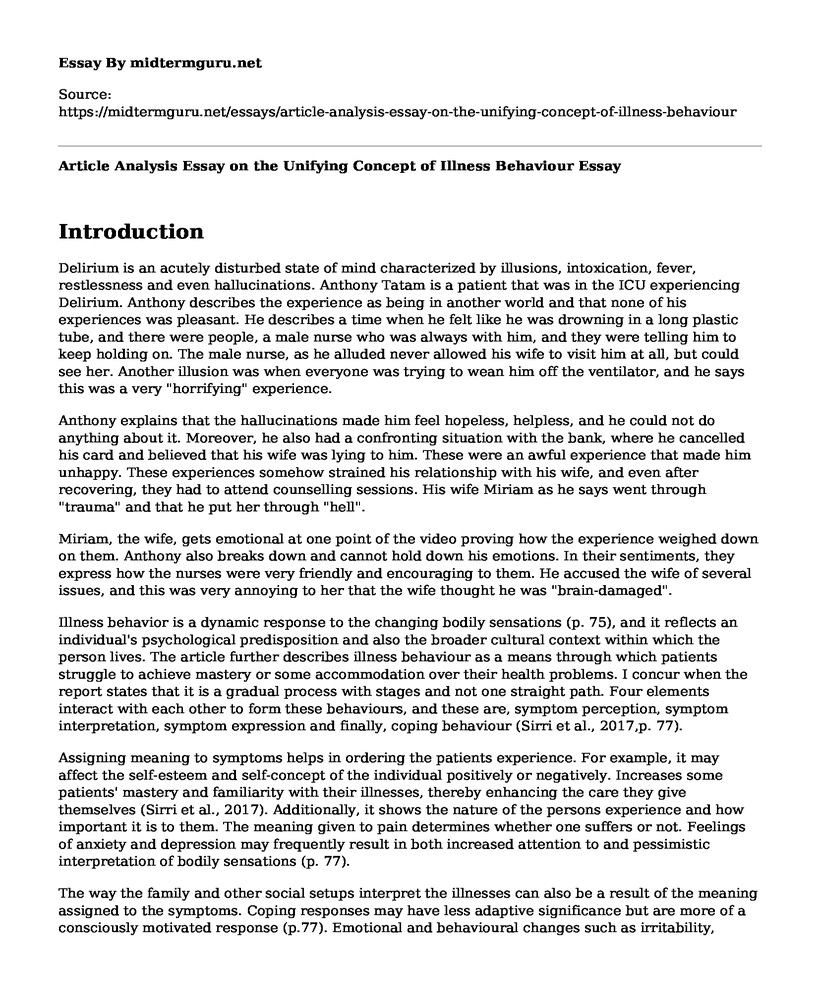Introduction
Delirium is an acutely disturbed state of mind characterized by illusions, intoxication, fever, restlessness and even hallucinations. Anthony Tatam is a patient that was in the ICU experiencing Delirium. Anthony describes the experience as being in another world and that none of his experiences was pleasant. He describes a time when he felt like he was drowning in a long plastic tube, and there were people, a male nurse who was always with him, and they were telling him to keep holding on. The male nurse, as he alluded never allowed his wife to visit him at all, but could see her. Another illusion was when everyone was trying to wean him off the ventilator, and he says this was a very "horrifying" experience.
Anthony explains that the hallucinations made him feel hopeless, helpless, and he could not do anything about it. Moreover, he also had a confronting situation with the bank, where he cancelled his card and believed that his wife was lying to him. These were an awful experience that made him unhappy. These experiences somehow strained his relationship with his wife, and even after recovering, they had to attend counselling sessions. His wife Miriam as he says went through "trauma" and that he put her through "hell".
Miriam, the wife, gets emotional at one point of the video proving how the experience weighed down on them. Anthony also breaks down and cannot hold down his emotions. In their sentiments, they express how the nurses were very friendly and encouraging to them. He accused the wife of several issues, and this was very annoying to her that the wife thought he was "brain-damaged".
Illness behavior is a dynamic response to the changing bodily sensations (p. 75), and it reflects an individual's psychological predisposition and also the broader cultural context within which the person lives. The article further describes illness behaviour as a means through which patients struggle to achieve mastery or some accommodation over their health problems. I concur when the report states that it is a gradual process with stages and not one straight path. Four elements interact with each other to form these behaviours, and these are, symptom perception, symptom interpretation, symptom expression and finally, coping behaviour (Sirri et al., 2017,p. 77).
Assigning meaning to symptoms helps in ordering the patients experience. For example, it may affect the self-esteem and self-concept of the individual positively or negatively. Increases some patients' mastery and familiarity with their illnesses, thereby enhancing the care they give themselves (Sirri et al., 2017). Additionally, it shows the nature of the persons experience and how important it is to them. The meaning given to pain determines whether one suffers or not. Feelings of anxiety and depression may frequently result in both increased attention to and pessimistic interpretation of bodily sensations (p. 77).
The way the family and other social setups interpret the illnesses can also be a result of the meaning assigned to the symptoms. Coping responses may have less adaptive significance but are more of a consciously motivated response (p.77). Emotional and behavioural changes such as irritability, anger, withdrawal, denial, hopelessness, powerlessness, fear and lack of energy are mentioned. The article presents some instruments that have been designed to measure illness behavior including self-rating scales (p. 78)
Conclusion
In conclusion the insight from this article validates several responses shown by Anthony and his wife. One significant aspect is the symptom perception, and symptom interpretation and Miriam, Anthony's wife expressed not having understood the husband's illness till a later stage, and this affected her behavior and psychological state. She was devastated since she thought Anthony had brain damage, but once she understood Delirium, it got better for her. Anthony had a tough time dealing with his Delirium, and this satisfies some of the emotional responses such as pain, irritability, anger and hopelessness. Anthony mentioned being hopeless at one point. Besides, acute illnesses may cause an enormous toll on an individual and the family, and it is essential to understand the factors that lead to this. These are all included above through the help of the article.
Reference
Sirri, L., Fava, G. A., & Sonino, N. (2013). The unifying concept of illness behaviour. Psychotherapy and Psychosomatics, 82(2), 74-81. https://www.karger.com/Article/Abstract/343508
Cite this page
Article Analysis Essay on the Unifying Concept of Illness Behaviour. (2023, Feb 02). Retrieved from https://midtermguru.com/essays/article-analysis-essay-on-the-unifying-concept-of-illness-behaviour
If you are the original author of this essay and no longer wish to have it published on the midtermguru.com website, please click below to request its removal:
- Essay on Marxs Theory of Alienation and Philosophical Categories
- Chronic Condition Management - Paper Example
- The Healthcare Policy Issue: Unsafe Care for the Patient and Burnout for the Nurse - Paper Example
- Essay Sample on Productive Businesses Priorities
- Addressing Nursing Shortage & Improving US Health Care - Essay Sample
- Essay Sample on Diabetic Ketoacidosis (DKA)
- Personality Development: Foundations, Features, and Influences - Essay Sample







